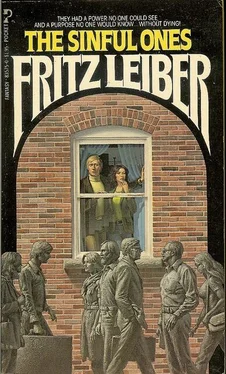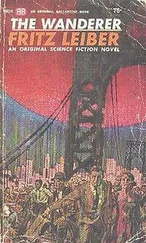She seemed to complete a calculation. “Sure,” she said, looking up at him with a suddenly unambiguous smile.
“Pickup!” Miss Hackman’s whisper was faint as before, and as contemptuous. “I never saw anything so amateurish. It’s like a highschool play.”
Carr slid his arm around Jane’s, took her hand. He started with her down the street, toward the brighter lights. He heard the footsteps of the three keeping pace.
“But it’s obviously the girl!” Miss Hackman’s whisper was a trifle louder. “She’s just bleached her hair and trying to pass as a whore.”
As if she feared Carr might turn, Jane’s hand tightened spasmodically on his.
“You can’t be sure,” whispered Mr. Wilson. “Lots of people look alike. We’ve been fooled before. What do you say, Dris?”
“It’s the man all right,” the whispered voice of the handless man responded. “But I followed him for a while tonight and I think he’s okay.”
“But if it’s the same man…?” Miss Hackman objected. “Remember I saw him with the girl at the employment office.”
“Yes,” Mr. Wilson responded, “and we decided that she’d tricked us there and he wasn’t a real accomplice at all. Which should indicate that this can’t be the girl.”
Carr felt the whispers falling about them like the folds of a spiderweb. He said loudly to Jane, “You look swell, kid.”
“You don’t look so bad yourself,” she replied.
Carr shifted his arm around her waist, brushing her hips as he did. But his eyes were searching the street ahead. The scene had no changed. The machinery of Nickel Heaven was in full blast. The two men in dark slickers across the street had been joined by two more. The taxi in front of the drugstore was still chugging. Fringing the field of his vision to either side, were blurred bobbing segments of Mr. Wilson’s panama hat and pinstriped paunch and Miss Hackman’s green gabardine shirt and nyloned legs.
“You agree with me about the girl, don’t you Dris?” Mr. Wilson asked.
“I think so.” But this time the handless man’s voice lacked assurance. “But I can’t be sure, because…well I’m not absolutely sure about the man. It’s just possible that he fooled me.”
Miss Hackman leaped at the opportunity. “Exactly. And I think they’re still faking. Let me test them.”
Through the skimpy dress Carr felt Jane shaking.
“Put that away!” Mr. Wilson whispered sharply.
“I will not,” Miss Hackman replied.
They were almost at the corner. They were passing the black convertible. The figure of a bleary-eyed man in a faded blue shirt lurched up onto the curb and came weaving across the sidewalk. Carr steered Jane out of his way.
“Disgusting,” Jane said.
“I’d have taken a crack at him if he’d bumped you.”
“Oh, he’s drunk,” Jane said.
“I’d have taken a crack at him anyway,” Carr asserted, but he was no longer looking at her. The cab driver had come hurrying out of the drugstore.
“Come on, kid,” said Carr suddenly, stepping ahead and pulling Jane after him. “Here’s where we start to travel fast.”
“Oh, swell,” breathed Jane. Her eyes went wide as she looked at the taxi. They hurried toward it.
Beyond the corner, the men in dark slickers left the pawnshop window and headed toward them.
Miss Hackman’s whisper was almost a wail. “They’re getting away. You’ve got to let me test them.”
The cab driver ducked his head to get in. Simultaneously car reached for the door.
“It might be better…” came Dris’ voice.
Cold as ice, Carr held the door for Jane. From the corner of his eye he saw Miss Hackman’s hand. In it was one of the stiff daggerlike pins from her hat.
“Well…” began Mr. Wilson. Then, in an altogether different voice, still whispered, but tense with agitation and surprise, “No! Look! Quick, we’ve got to get out of here!”
Carr stepped in after Jane, slammed the door, dropped into the seat. The taxi jerked forward, but behind them he heard a more powerful motor roar into life.
He ventured a quick look back.
The black convertible was speeding down South State, away from them.
At the curb they had left stood a knot of men in dark slickers.
Carr unlocked the door to his room, hurried to the windows, pulled down the shades, went back to the door, looked down the dark hall, listened for a few moments, finally locked and bolted the door.
Only then did he switch on the light.
“Do you really think it’s safe here?” Jane asked him. Framed by an amateurishly bleached hair, her face looked small and tomboyish.
“Safer than taking our chances somewhere else,” he told her. “I don’t think they know my address yet.” He frowned. “What do you suppose scared them off at the end?”
“I didn’t know they were scared of anything,” she said.
“There were those men in slickers…” he began doubtfully.
“They aren’t scared of men,” she told him, her gaze straying toward the bolted door.
“I’ll get us a drink,” he said.
As he added water to whisky in the bathroom he remembered the motionless head and fat neck of the thing driving the taxi as they had slipped out at a red light near La Salle and Grand. Everything around him grew distorted-looking and horribly solid. It seemed to him impossible, in a universe of recalcitrant mechanisms, that he should be able to unscrew the cap of a whiskey bottle, to turn a faucet, even to push aside the thick air as, the dingy white floor seeming to rock under his feet, he dizzily fought his way out into the bedroom.
Jane sprang toward him.
“It’s all impossible,” he assured her gaspingly. “We’re both insane.”
She grabbed his arm above the elbow, squeezed it. “I’ve said that to Fred,” she told him unpityingly, “many times. And to myself.”
He squeezed his eyelids. The floor steadied under him. She took one of the drinks from him. He drank a mouthful from the other.
“An insane delusion could be shared…” he began.
She just looked at him.
“But if we aren’t insane,” he continued tormentedly, “what’s made the world this way? Have machines infected men, turning them into things like themselves? Or has man’s belief in a completely materialistic universe made it just that? Or…” He hesitated “…has the world always been this way—just a meaningless mechanical toy?”
She shrugged.
“But why should we be the ones to awaken?” he went on with growing agitation. “Why, of all the billions, should we two be the ones to grow minds, to become aware?”
“I don’t know,” she said.
“If we only knew how it happened to us, we might have some idea…” He looked at her. “Jane,” he said, “how did it happen to you? When did you first find out?”
“That’s a long story…”
“Tell it to me.”
“…and I’m not sure it explains anything.”
“Never mind, Jane. Tell it to me.”
She looked at him thoughtfully. “Very well,” she said softly. She sat down on the edge of the bed, almost formally, and took a sip of her drink.
“You must think of my childhood,” she began, “as an empty, overprotected, middle-class upbringing in a city apartment. You must think of me as unhappy and frightened and lonely, with a few girl friends whom I though silly and ignorant and at the same time more knowing than myself.
“And then my parents—familiar creatures I was terribly tied to but with whom I had no real contact. They seemed to go unhappily through a daily routine as sterile as death. They got excited over newspaper stories that didn’t have anything to do with them. And yet they were blind to a thousand strange and amazing things that were happening right around them.
Читать дальше









